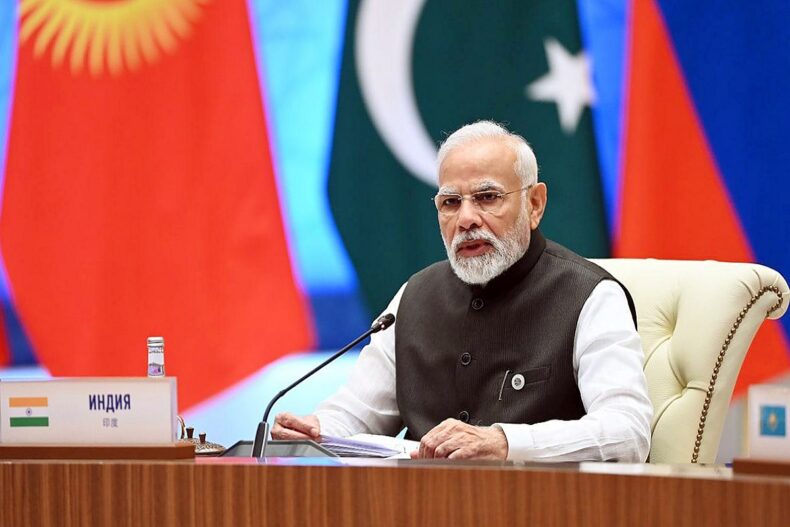In order to discuss important regional security threats as well as matters like commerce, investment, and energy supplies, Prime Minister Narendra Modi today visited the Shanghai Cooperation Organization’s first in-person meeting in the last two years in the ancient Uzbek city of Samarkand. The SCO is an essential alliance that includes Central and South Asia.

In the geopolitical environment, where China has been displaying its aggressive tactics towards the country island of Taiwan and Russia has been invading Ukraine, this meeting, which was attended by eight powerful countries, has been hailed as a hopeful sign of optimism. The Shanghai Cooperation Organization (SCO), which was established in June 2001, now has eight full members, including its six founding nations: China, Kazakhstan, Kyrgyzstan, Russia, Tajikistan, and Uzbekistan. In 2017, Pakistan and India became full members.
This time, the summit will take place in Samarkand, Uzbekistan, while India will serve as the host nation in 2024.
Mr. Narender Modi, the Indian Prime Minister, visited the SCO, or Shanghai Cooperation organization. He said that the present administration has been emphasizing the “people-centered development approach” and added, “We are promoting innovation in every industry. In our nation today, there are over 100 unicorns and over 70,000 start-ups, says Samarkand, Uzbekistan.
He went on to say that recent events like COVID-19 and the Russia-Ukraine War have altered the trajectory of the world supply chain. The goal of the PM’s administration is to elevate India to a top global manufacturing location.
The International Monetary Fund predicted that India’s economy would expand by 7.2% this year, and Modi said that India’s economy was one of the world’s fastest-growing.
In addition, he said, “India would take an initiative for a new SCO working committee on traditional medicines.”
In Gujarat State, the World Health Organization (WHO) opened its Global Center for Traditional Medicines in April 2022. This was the first and only worldwide center for conventional medicine established by the WHO. The innovation of a new SCO working group on traditional medicines would be administered by India.
In addition to congratulating India for hosting the SCO Summit in 2024, Chinese President Xi Jinping pledged China’s assistance to India. Chinese President Xi stated, “We would back India for its presidency next year.”
Later, Mr. Modi and Tayyip Erdogan of Turkey had a private meeting. According to PMO, “the two leaders discussed how to strengthen bilateral cooperation in a variety of industries.”
Pakistan and India at SCO
Keeping India in mind Pakistani minister Bilawal Bhutto Zardari said that his nation has not yet made a decision on hosting the event the following year. “India presently has the SCO chairperson. Pakistan’s participation in the next SCO meeting has not yet been decided, he added.
On Friday, the presidents of India and Uzbekistan met with the host nation’s president, Shavkat Mirziyoyev, outside of the Shanghai Cooperation Organization (SCO) conference in Samarkand.
The SCO 2022 is now chaired by Uzbekistan, and India will take over as chair in 2024. Before that, PM Modi was welcomed by President Mirziyoyev at the Congress Center in Samarkand for the 22nd SCO Summit.
Russia and India
Russian President Vladimir Putin informed Indian Prime Minister Narendra Modi on Friday that he is aware of India’s stance on the Ukraine crisis and that “we want all of this to stop as soon as possible” during their bilateral discussion on the sidelines of the SCO summit in this city. “I am aware of your views on the turmoil in Ukraine. I am aware of your worries. As quickly as possible, we want this to all be over,” stated Putin.
China and India
Modi spoke separately with the leaders of Russia’s Vladimir Putin, Iran’s Ebrahim Raisi, Uzbekistan’s Shavkat Mirziyoyev, and Turkey’s Recep Tayyip Erdogan on the sidelines of the summit. However, Modi and Xi did not have a bilateral meeting.
Since the beginning of the border stalemate in eastern Ladakh, Modi and Xi have not physically interacted.
He returned to India after the conference, thanking the locals and government.
Read More: National Logistics Policy Introduced in India












